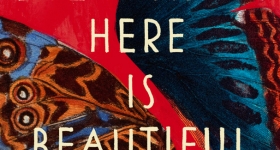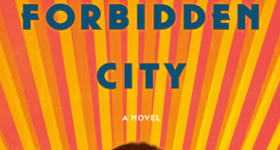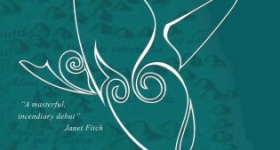We're so pleased to bring you the following excerpt from (former music editor!) Tanwi Nandini Islam's debut novel Bright Lines, freshly out on stands this Tuesday. The novel follows a family in Brooklyn: from the immigrant father with secrets he can't let go of, to his rebellious daughter unsure of her first serious relationship, to his niece/adopted daughter who hallucinates sleeplessly at night and wrestles with her gender and sexuality. Set amidst the backdrops of a Brooklyn garden and apothecary and the Bangladesh Liberation War, the writing is simultaneously, rich, emotional, quiet, and raw in all the right places.
-- Karissa Chen, Fiction & Poetry Editor
He saw a solitary light in the kitchen. His wife’s beauty salon, the eponymous Hashi’s, was closed for the day. His third-floor tenant’s apartment: lights off. He mouthed her name, Ra-mo-na Es-pin-al. She worked the night shift today. No glimpses until morning.
Anwar cleared his throat as to give a speech, but decided to watch the scene in the kitchen window.
His wife, Hashi, cast a fistful of onions into a pot, then several pinches of spice. She dipped the spoon into another pot and had a taste. She closed her eyes and took a deep breath, then yelled, “Charu! Charu!” A minute later, their daughter Charu entered, giving Hashi a light hug from behind. Hashi turned to look at her.
Anwar tiptoed into the house, hoping to surprise them. He paused for a moment, in the darkness. Do not enter, he thought, suppressing the urge to giggle.
From this angle, Hashi’s back was turned. Staccato chopping of carrots filled the room, breaking his reverie. The pot of onions and turmeric hissed in canola oil, splattering grease onto the wall. Charu sat at the table, staring at an array of objects arranged like a daisy on the plaid tablecloth: a pile of empty cigarette packets, some rather compromising photos of Charu at the beach, and the prize, in the center, a condom wrapper, empty of its goods.
“Do—you—want—to—die?” he heard Hashi say.
Charu protested, “Ma, I told you! I was at the beach—that’s what people wear to the beach! Those are my cigarettes from a long time ago—I quit! The condom was from sex ed—I just wanted to see what it looked like!”
“You—are—not—my—daughter—You—are—nothing—like—me,” Hashi said, her back pumping up and down as she chopped.
“Ma,” Charu implored.
“Nothing!”
Anwar decided this was the moment to walk in.
“Er, what is happening, ladies?” he asked. He swiped a carrot from the cutting board. A second later and Hashi would’ve severed a fingertip.
“Your daughter tells lies and your daughter is doing sex and your daughter is doing smoking and your daughter is not mine,” Hashi said. She turned to look at Anwar. She set down the knife and crossed her arms, as if waiting for his response.
Anwar stared at Hashi, and then at their child, back and forth. Hashi’s hair was pulled back in a severe bun, her cheeks flushed with anger. She was yellow-skinned, slender, eyes sharpe as a hawk’s; he still glimpsed traced of that haughty girl he’d been incensed with back when he knew her as his comrade Rezwan’s little sister. And Charu, skin tanned by these secret beach excursions, womanish curves she’d inherited from neither him nor Hashi. He imaged Charu’s visage as his own mother’s. He couldn’t remember; she’d died before he’d known her breast. The sole photograph of his mother had been eaten by the elements, marring her face.
Charu’s enormous eyes were dead cold. It was a look that often corrupted his daughter’s sweet face. Long gone were the days when they rode the subway all the way to Queens for singing lessons.
“Hashi, I am sure Charu’s explanation is sufficient,” he said.
“No!” Hashi spat.
Guess that’s the wrong answer.
“No dinner. Charu will be alone tonight, and I won’t hear another word.”
“Arré, Hashi, it’s not fair—she is a growing girl. She must eat.”
“Fine by me!” yelled Charu. “I’m going out, anyway.”
“It’s almost nine at night. You aren’t going anywhere,” said Hashi.
“I’m eighteen. It’s Saturday night and I can do—“
“Shut. Your. Mouth. You’re not eighteen yet. You don’t even have a summer job. That would keep you in line.” A fleck of spit from Hashi’s mouth landed on her chin. Anwar thought better than to dab it away.
“I told you, I’m working. On my clothing line.”
“With what money? What fabric?”
Charu inhaled—Anwar knew this was the momentary calm before the storm. If he remembered correctly, Hashi had promised her leftover dresses and textiles from wedding parties.
“I’ll be gone soon enough. And I’m never eating this shit again!”
Charu shoved the dining table. Photos flew through the air like a dandelion clock. She ran into her father, and let go a wretched banshee shrill when he didn’t move out of her way. She forced her way past, stomped to her bedroom, and slammed the door. A minute later, the sound of objects being thrown against a wall—a stiletto, a dumbbell, anything within her reach. Then, a furious clanging of a Tibetan meditation bell, found at a German exchange student’s schnickschnacks sale.
Fathering a teenage girl, rough stuff, thought Anwar, as he picked up a photo that had landed by his foot. In the photo, Charu’s lips kissed a dreadlocked boy’s ear: Malik. He felt a strange pang seeing the picture, jealousy tinged with admiration. He had suspected his younger daughter was dating Malik. The boy was his intern at the apothecary, and did seem to be around the house often these past few months. The kids had grown up together in the neighborhood. Both were seniors at Brooklyn Tech; graduation was in two weeks. Charu would be headed to NYU, while Malik would be going to the New School. Anwar wondered if this meant they would continue their relations; it was pretty convenient. Malik was a soft-spoken, handsome Black boy. A solid, sensitive young man, better than what any stern, absentminded father could ask for. Anwar could stand him and that meant a lot.
Anwar wondered how Charu knew this feeling of love. It was further proof of their distance. Had the movies taught her?
Hashi bent over and picked up the photographs.
“I cleaned her room today and came upon this,” said Hashi. “She’s not growing up a good person. Look at this.” She pointed to another photo: bikini-clad Charu, eating a corn dog at Coney Island, pursing her lips around the thing rather—suggestively.
He missed Ella. She was a sophomore at Cornell’s agricultural school—a choice she’d made given her knack for tending their gardens. Ella remained remote, but within his grasp. She never intruded upon Anwar’s sensibility and listened to him about most matters. Her left eye had a tendency to turn this way and that behind her spectacles, and he wondered what she was looking at. If she were here, thought Anwar, her calm would keep Hashi’s nerves intact; she would find some way to make Charu laugh.
His two children were as different as their fathers had been.
From Bright Lines: A Novel by Tanwi Nandini Islam, published on August 11, 2015 by Penguin Books, an imprint of Penguin Publishing Group, a division of Penguin Random House LLC. Copyright by Tanwi Nandini Islam, 2015.










Comments